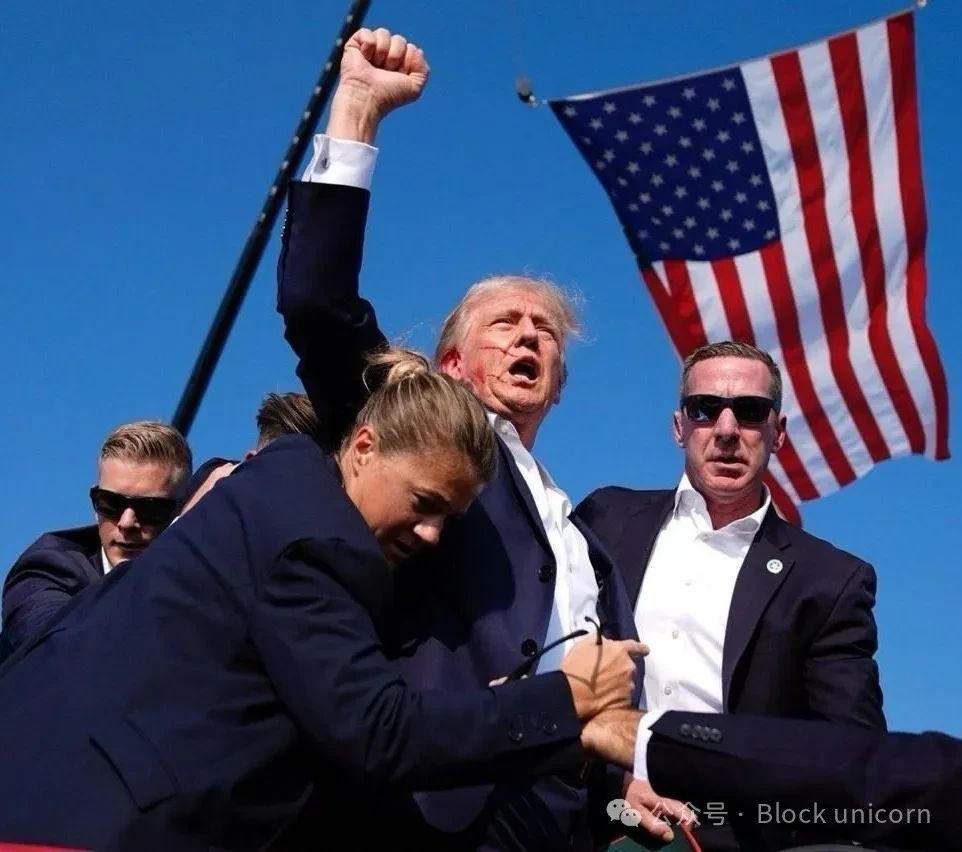Trump'ın Suikast Girişiminden Sonraki Kripto Politikası: Başkanlık İçin Yeni Bir Yön
Original author: Mike Orcutt
Orijinal çeviri: Blok tek boynuzlu at

What does Trumps support for cryptocurrencies mean?
We said in our coverage that cryptocurrency is everything. It’s a technology, a market, an industry, even a culture. Lately, it’s also tried to become a political party. So now that Donald Trump has officially endorsed cryptocurrency, it’s worth examining what that means.
The Trump campaign this week released a 16-page document called the 2024 Republican Platform, which adds a layer of detail to Trumps campaign rhetoric over the past month or two — known as the partys political distribution.
In a section titled “Driving Innovation,” the platform has two sentences specifically about cryptocurrencies:
The Republican Party will end the Democrats’ illegal and un-American cryptocurrency crackdown and oppose the creation of a central bank digital currency. We will defend the right to mine Bitcoin and ensure that every American has the right to custody their digital assets and trade them free from government surveillance and control.
Behind the partisan language, we get a glimpse into how President Trump might approach cryptocurrencies, but there are also some unanswered questions about how he would differ from Joe Biden. Let’s take a line-by-line look.
Republicans will end the Democrats’ illegal and un-American cryptocurrency crackdown…
There is a widespread belief in the industry, including among Democratic voters, that the Biden administration has been hostile to cryptocurrencies. This is not because of anything Biden himself said or did. If there is a so-called crackdown, it is basically the result of enforcement actions taken by executive agencies within the Biden administration, most notably the Securities and Exchange Commission (SEC), the Treasury Department, and the Justice Department.
The Trump administration will end the tenure of current SEC Chairman Gary Gensler, who most cryptocurrency enthusiasts consider a major antagonist. They say he has hampered cryptocurrency innovation in the U.S. by filing baseless lawsuits against good-faith players in the industry. Whoever Trump appoints to lead the SEC in the future will almost certainly be friendlier to the industry than Gary Gensler, who has aggressively sought to impose the same strict regulatory regime that governs stock and bond trading.
Another battle the Biden administration has picked up in the cryptocurrency space is in the realm of national security. Most notably, the Justice Department has indicted two developers of the Ethereum-based privacy application Tornado Cash, accusing them of money laundering and violating sanctions against North Korea. Previously, the FBI determined that North Korean state-backed hackers used Tornado Cash to cover their tracks after stealing $600 million from the crypto game Axie Infinity.
Defenders of the Tornado Cash developers argue that the indictment is an unconstitutional attempt to criminalize software development. But is this part of the “illegal” crackdown that Trump has mentioned in his new platform? We don’t know yet.
This is where things can get awkward.
As we’ve discussed before, the North Korean government’s adoption of Tornado Cash puts crypto on the spot. This “permissionless” privacy tool allows anyone with an internet connection to transact in cryptocurrency without leaving any trace. By design, this means North Korea can freely use it to launder stolen cryptocurrency used to fund its weapons programs. Crypto purists will say this is simply the price of being truly permissionless. But let’s not kid ourselves: no American president would like this situation.
This is not a Republican-Democratic issue. This is about America’s national security and geopolitical power. Because the U.S. dollar is the world’s reserve currency, other countries must hold dollars if they want to trade. This means that most of the world’s trade flows through U.S. banks. This means that the U.S. has the ability to effectively exclude other countries, especially adversaries like North Korea, from the global financial system by imposing economic sanctions.
Trump understands this as well as anyone. So why (and, just as importantly, how) might a Trump administration treat software developers like Tornado Cash differently than a Biden administration?
and opposes the creation of a central bank digital currency
It is indeed somewhat odd that Trump’s platform features this stance so prominently in the cryptocurrency section. What does supporting cryptocurrencies have to do with central bank digital currencies (CBDCs)? If cryptocurrencies are the future of money, why aren’t governments adopting this technology?
It’s partisan politics in a nutshell. Just a few years ago, the idea that the Federal Reserve might suddenly issue a “digital dollar” was hardly controversial in Washington. After all, our lives are increasingly digital. China and many other countries are developing digital versions of their own currencies. Why not the United States?
However, about two years ago, Republican politicians began claiming that the Biden administration wanted to issue a central bank digital currency (CBDC) in order to monitor and review the purchases of ordinary Americans. Florida Governor and then-highly-watched presidential candidate Ron DeSantis said the government wanted to use the CBDC network to prevent people from buying guns and fossil fuels. Conservative lawmakers began to introduce bills to prevent the Federal Reserve from issuing digital currencies.
It is somewhat mysterious how the anti-CBDC stance ties in with the Republican Party’s overall stance on cryptocurrencies. Perhaps it is simply because the politicians who are most actively against CBDCs also tend to be pro-cryptocurrencies. One Republican view is that unless a CBDC is “open and permissionless,” it should not be allowed to be issued. There has been no explanation as to how this is technically possible.
In fact, neither the Fed nor the Biden administration has ever planned to issue a CBDC. How a CBDC would work (including how it could be private and cash-like) is still a subject of academic research. Advanced cryptographic tools such as zero-knowledge proofs have shown potential to provide both privacy and compliance, and there is currently no reason (other than skepticism of governments) to think that a future CBDC could not or would not take advantage of this.
Before the issue became so heated, the Federal Reserve Bank of Boston was conducting a complex study of how a retail-scale system would work from a technical perspective — including how advanced privacy technologies might fit into it. But in late 2022, the bank halted the study after coming under fire from Republican members of Congress, who may have helped draft this policy stance.
In fact, the CBDC discussion is more complicated than domestic politics. As China and other countries develop more innovative ways to transfer money digitally, some believe that unless the United States upgrades the dollar’s technology, the dollar’s role in the world may decline. Incidentally, one of the promises in Trump’s platform is to “maintain the dollar’s status as the world’s reserve currency.”
We will defend the right to mine Bitcoin…
For some reason, Trump has recently shown a special fondness for Bitcoin. He even adopted the popular views of Bitcoin enthusiasts. Last month, he met with executives of Bitcoin mining companies at Mar-a-Lago, and later posted on his social media platform that Bitcoin mining may be our last line of defense against CBDC, and it will help us dominate the energy field!!
The latest news is that Trump plans to speak at a major Bitcoin conference in Nashville later this month.
…and ensure that every American has the right to keep their digital assets in their own custody and to trade them free from government surveillance and control
It’s hard to overstate how dramatically the politics of cryptocurrency have changed since the collapse of Sam Bankman-Fried’s FTX, an event that angered crypto skeptics in Washington, most notably Massachusetts Senator Elizabeth Warren.
In late 2022, Warren introduced the Digital Asset Anti-Money Laundering Act, a bill that angered and frightened the cryptocurrency lobby because it was interpreted as an attempt to ban self-custody, or the power to control ones own cryptocurrency rather than relying on a third party. Doing so requires a piece of software called a wallet, and Warrens bill would require developers of self-custody wallets to identify their customers and monitor their transactions for suspicious behavior. Policy advocacy group Coin Center called the bill an unconstitutional attack on cryptocurrency self-custody.
In February 2023, Politico reported that Warren (Vice Chairman of the Democratic Party), who is influential within the party, is building an anti-crypto army. Her radical stance is seen as a real existential threat in the industry. An anti-crypto army has begun to gather in Washington, D.C. to fight back, and recently, this army has been on a winning streak.
Its main opponent is a super PAC called Fairshake, which is backed by Coinbase, Ripple, Andreessen Horowitz, and others, and has raised $169 million, making it one of the richest PACs in the election cycle. According to CoinDesk, Fairshake has supported more than 20 congressional primary victories so far and has targeted anti-cryptocurrency candidates through advertising spending.
And then there’s Trump himself. The fact that he even used the term “self-custody,” let alone elevated it to the level of a presidential campaign, was a direct attack on the anti-crypto brigade.
But now it appears that there is little left of that army. In May, a large number of Democrats voted with Republicans — against the guidance of Gensler and Warren — to pass two bills supported by the crypto industry. This week, Anita Dunn, one of Biden’s closest advisers, participated in a “crypto roundtable” hosted by Democratic Rep. Ro Khanna. According to Decrypt, some industry members in attendance were encouraged and “optimistic” that Democrats and the administration could work with the industry.
The Trump campaign’s decision to frame its crypto policy stance in politically charged language reflects an attempt to use this issue as a jumping-off point to cast themselves as the destroyers of the anti-crypto brigade, perhaps already destroyed by Trump. Two years ago, self-custody might have been in jeopardy, but Washington appears to have moved on. Gary Gensler (SEC Chairman) and Warren (Democratic Vice Chairman Elizabeth Ann Warren) have lost influence. The question now is, if Trump is elected, what specifically will he do in terms of crypto policy?
If youre not familiar with Donald Trump, he says a lot of things, including a lot of things he doesnt mean. So all this pro-crypto talk is probably political lies that will disappear after the election. However, the anti-crypto army may soon find a powerful ally in the White House.
This article is sourced from the internet: Trump’s Crypto Policy After the Assassination Attempt: A New Direction for the Presidency
In the past 24 hours, many new popular currencies and topics have appeared in the market. It is very likely that they will be the next wealth-making opportunities. The sectors with relatively strong wealth-making effects are: DePin (MOBILE, HONEY), ETH ecosystem (ENS, SSV) Hot searched tokens and topics: Sentient, Astar Network, TAO Potential airdrop opportunities include: Linea Surge, Solayer Data statistics time: July 4, 2024 4: 00 (UTC + 0) 1. Market environment The overall crypto market fell yesterday, and the price of Bitcoin briefly fell below $58,000, and the overall panic in the crypto market soared. Most mainstream currencies have fallen below the daily bull trend line, and the market may have the possibility of further decline. Yesterday, the Federal Reserve released the minutes of the meeting, saying that…







